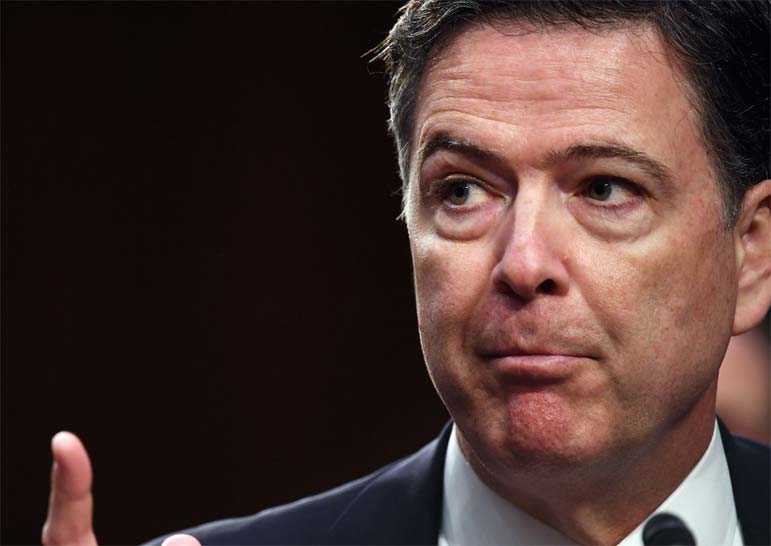 Sarah Parnass for The Washington Post
Sarah Parnass for The Washington Post
Former FBI director James Comey's new book and media tour have been closely scrutinized in all kinds of ways, but there should be a lot more media discussion about another inescapable takeaway from his revelations: The grievances of Hillary Clinton and her supporters about what happened in the 2016 election have proved to be well-grounded and legitimate.
Comey has just given a new interview to NPR that drives this home. In it, Comey admits that his decision to sharply criticize Clinton at a July 2016 news conference - at which he closed the email probe - was not only a break with department protocol but also that it would have been "reasonable" under the circumstances to have said nothing.
Asked by NPR's Steve Inskeep what the FBI would have done to close the case if it had been an "ordinary investigation," Comey said:
"'In the ordinary case, we would most likely in writing prepare some sort of summary of what our investigation had determined and then send it over to the Justice Department, and they would in the ordinary case either say nothing, which is the most common case, or at most issue a letter to the target saying, or the subject saying it's over, or some minimal statement about it.'"
Under ordinary circumstances he'd never publicly criticize the subject. Comey has repeatedly said this case was extraordinary because the FBI would come under heavy scrutiny after closing a probe into a presidential candidate, and he didn't want the public to lack confidence in the electoral outcome if Clinton won. Comey repeated this to NPR.
But Inskeep then pressed Comey on why he thought public confidence in a Clinton win might be lacking. Inskeep noted that Comey writes in his book that, initially, Comey thought it was absurd to see Bill Clinton's infamous meeting on a tarmac with then-Attorney General Loretta E. Lynch as part of a conspiracy to exonerate Hillary Clinton, as many on the right were painting it. But Comey wrote that cable TV coverage of it as allegedly nefarious influenced his thinking about how the FBI would be perceived in all this and how to handle the Clinton probe. Then the following exchange happened:
"INSKEEP: Would it perhaps have been a better course of action to resist all that shouting out there and do something closer to what you would normally do?
"COMEY: Look, I meant what I said earlier - a reasonable person might have done that. I think that would have been a mistake . . ."
Comey went on to claim that other factors, not just cable coverage, led him to conclude that public confidence would be in doubt. So this is not an admission of error on Comey's part. But it is an admission that the cable news chatter partly influenced him, and that it would have been reasonable to refrain from doing what he did end up doing. In other words, he didn't have to do it. And if he had refrained, he would not have lodged public criticism of Clinton, which surely helped fuel media coverage that created the impression that both Clinton and Donald Trump, with his history of business grift and shady dealing, had equivalent "question marks hanging over their heads," as Brian Beutler puts it on crooked.com.
Now apply this to another key revelation from Comey, this one concerning his decision to announce 11 days before the election that "new" emails relevant to the Clinton probe had been discovered. In his book, Comey admits: "It is entirely possible that, because I was making decisions in an environment where Hillary Clinton was sure to be the next president, my concern about making her an illegitimate president by concealing the restarted investigation bore greater weight than it would have if the election appeared closer."
The through line between these two events is why Comey worried about this prospect. If media attacks - many of which came from the right - on the FBI's handling of the Clinton probe helped influence his decision to hold the July 2016 presser, it is almost certainly true that this weighed on his decision to announce the "new" emails as well.
As Jonathan Chait explains, Comey's willingness to let such concerns influence these episodes reflects the success of a decades-long campaign by Republicans and GOP-aligned media to skew the political dialog by hyping fake scandals, which in this case led Comey to act to "avoid charges of favoritism," thus willingly handing bad-faith actors leverage over law enforcement. It's hard to read Comey's NPR interview as anything other than confirmation of this. Worse, Comey also revealed that not allowing this to happen would have been a perfectly appropriate outcome.
All of this implicates the media's conduct as well - both before and after the fact. Though Comey's last-minute email revelation admittedly created a complicated editorial conundrum, it was widely hyped by the media in a manner that was surely disproportionate, given that at the time, no one knew whether the emails amounted to anything at all (which, it turned out, they didn't). As Nate Silver has shown, the episode may have helped tip the election to Trump.
When supporters of Clinton made these points after the election, they were widely derided for being in denial about the real reasons Clinton lost. The notion that Comey and related over-the-top press coverage might have played an important role was greeted - including by some neutral reporters - as self-evidently, uproariously, knee-slappingly absurd, as if it constituted nothing more than hopeless partisan brainwashing.
It is true that Clinton lost for all kinds of other reasons, including her own role in emailgate, her flaws as a candidate, multiple strategic failures by the campaign and various unhealthy tendencies in the Democratic Party. But as Comey himself has now confirmed, the conduct for which he was responsible didn't have to happen. Comey won't allow himself to take this extra step, but his own retrospective testimony also confirms that it should not have happened. It likely helped Trump win, and to the degree that it did, it produced genuine institutional and systemic failure on multiple fronts. Comey's media tour should lead us to forthrightly grapple with this - and to acknowledge that Clinton supporters are absolutely right to be bitterly angry over it to this day.
Previously:
• 09/12/16: Latinos in the tank for Hillary? What the current polling predicts
• 04/13/15: Clinton-Sanders brawl could spur reforms in the Democratic nominating process


 Contact The Editor
Contact The Editor
 Articles By This Author
Articles By This Author
